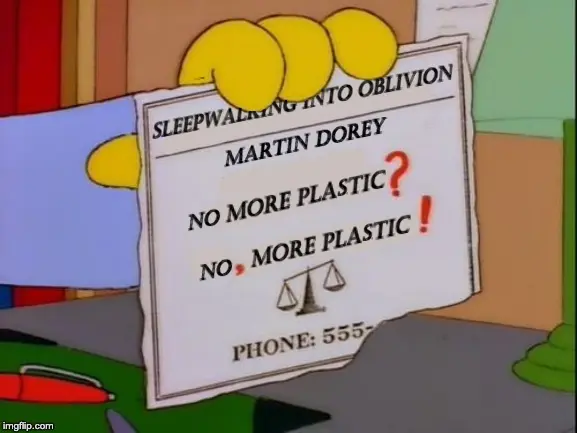It was a typo, he meant: No, more plastic!
Lionel Hutz, Esq
Free consolation? No, money down!
Better get rid of this bar association sticker too.

Oh I see, they mistaken thought the title was “No, MORE Plastic!”
They’re saying Boo-urns!
I don’t understand why some books are wrapped in plastic at all. Like is it to protect the cover? Prevent people from reading it at the book store? Some weird contract with a vendor that requires a percentage of books be wrapped? A quirk of the shop that printed the book?
It makes zero sense.
Probably so they can be stored carelessly in dirty warehouses that may or may not control for humidity
Used to work in a warehouse that did exactly this, can confirm drove a forklift loading pallets of books on trucks and “humidity control” meant closing the bay doors that didn’t have trailers backed in so the snow wouldn’t blow inside.
Probably also in case the shipping container leaks or has some termites or something?
Warehouses are dirty.
Aren’t books shipped in boxes though? I guess maybe a printer might palletize the books and find it cheaper to not wrap the whole pallet?
It still seems like the individual book is the wrong place to focus on protecting it from damage it might incur in transit.
They are shipped on shrink wrapped pallets in boxes. The thing is, your local Walmart/target/airport shop doesn’t need 1500 copies of the latest Patterson novel, they stock a few of each current book in store. Meaning that pallet gets opened up at a hub warehouse and 2-3 books are going to 2-300 different stores along with whatever else has been purchased that week to restock the shelf. That book passes though a lot of hands before you buy it at the register
When it’s wrapped in plastic it can be individually picked. In a warehouse large quantities of stuff is stored away in bulk, sometimes palletized. A picker goes around and picks out the items from the larger bulk of items to put together a shipping order. If they were individually wrapped, whether by the warehouse or their distributor, it is for general protection(so that it feels new) and ease of handling.
Source: worked many of the lower positions at different warehouses for some years.
Agreed.
Both is correct. But the second one is less about reading and more about making a crease. People who buy new books, want to be the first ones to read it. If they wouldn’t care, they would just go to the library.
Them: *lists 4 options*
You: “Both”
What do you mean? Of course I can count to two!
That’s a typo, it should read: “No. More plastic!”
I shouldn’t have this ALA logo here either
He’s right about sleepwalking into oblivion
Plot twist: it was corn starch based.
that’s still bad though. it requires petroleum based processes to grow the corn and then convert the starch into a plastic like substance when the book could have just not been shrink wrapped. i get that you’re joking, and i’m being pedantic, but not enough people realize bioplastics are not the solution, they’re a gap measure, like EVs, and i’m usingeyour comment as a soapbox
Bioplastics also cause contaminated petroplastic recycling batches, are difficult to compost (my city, like many cities, does not have the facility), and release methane when breaking down in a landfill.
What’s up with cities (in the US) not having the facilities for this? I know it’s not a perfect solution but everyone I see walking their dog in Los Angeles has these compostable bags.
Correct me if I’m wrong, but it sounds like Europe does (generally speaking). Is it a matter of laziness or something else on our part?
building these facilities must be funded by levies, and most jurisdictions vote no on most levies because no one ever feels like they can afford more taxes. really, if the world worked correctly, the richest people and companies would just pay for these things because society benefits them more than the rest of us, and we should receive benefits from society
I guess they could have been wrapped in bulk, but I wouldn’t say you can ship books around without any protection.
It could have been an e book though
A paper band is pretty good at protecting a book in transit.
My e-reader is e-waste.
Edit: it wasn’t by my choice. My kindle just died for no reason.
What about cellophane?
Plasticccc
Aye, but it’s based on a real treasure chest!
How did he pick out the publisher… Just whoever was offering the best deal?
The way publishing industry has been for a very long time, authors (especially first time ones) don’t get to pick whoever pays the best deal. Just whoever pays the first.
Edit: Also, theoretically, publishers should accommodate author wishes once a publication contract has been made. Actually not unheard of that a publisher would do something cool for their up and coming star. But this? Sloppiness on the publisher’s part, plain and simple.
The author doesn’t get to pick who can print his book? Or do you mean he has no real choice because he’s got bills to pay?
Authors have to submit manuscripts to publishers individually (or, in some markets, agents who work with multiple publishers in the same niche).
Publishers get showered with manuscripts. Very small percentage of them are what publishers deem will meet market goals.
In standard publishing contracts, the author gets paid an advance. This is basically the royalty percentage for the entire first print run. It’s not refundable. It represents the trust the publisher puts on the author, and if the publisher can’t sell all copies, well, tough for them. (They’d probably just not work with that author again.)
Getting to that point is a pretty massive hurdle to clear for first time authors.
So no, authors don’t really get to pick their publishers. The only scenario where people get to pick their publishers is some celebrity deal bullshit.
Interesting! I’m curious if he addresses this lack of choices in his proposals for how to make a difference.
Maybe I’ll just download it though.
From what you hear it’s that they have bills to pay. If a publisher doesn’t know your name, they’re not going to assume it’s an automatic best-seller so they’re less likely to actually look at your work to see if it’s worth it.
Also, to pay your bills before the publisher actually prints the book, you have to find one way ahead of you finishing the book, meaning that you have to send them an unfinished manuscript, further hurting your chances - but if they like it you get that money before it’s done, with the caveat that they’re gonna sue if you don’t deliver.
No. He’s that one unique author who looked for the worst deal for his work.
Or terms he finds acceptable
Transparent paper just doesnt have the same luminosity
deleted by creator
No. More. Plasticccc? Whelp, there goes my new hip and wheel chair and pain here I come!
wouldnt you want to argue for the reduction of consumer plastic, then, so the rest of this super limited resource can be saved for medical and scientific purposes?
I did mention that plastic water bottles and other such consumer level disposable plastics aren’t really required. Though the alternatives are much heavier and often bulkier than their plastic counterparts. Making them more difficult and costly to ship. And yeas, that includes basic food stuffs.
I dunno, friend. Maybe the title doesn’t contain the entire contents of the book.
The title most certainly doesn’t contain the whole book. But it does contain the whole belief of the author.
Somehow I doubt hips and wheelchairs are among the top offenders
Well, stop and think about all those plastic medical devices that get used. Everything from syringes to hips, to air tubing, to the packaging of sterilized surgical instruments. That’s a metric carp tonne of plastics. There are a LOT of life threat level safety devices that use plastics also.
We probably don’t need to bottle soda pop or water in plastic bottles, but the use of plastics will never go away.













